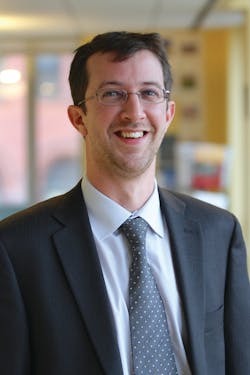Top 40 Under 40 2014: Benoit Lefevre Ph.D.
Dr. Benoit Lefevre leads an inter-disciplinary team working to promote the development and acceleration of sustainable transport solutions in emerging economies at Embarq. He is a published author, including lead author on “Cross-cutting Investment and Finance Issues,” chapter 16 of the April 2014 Intergovernmental Panel on Climate Change (IPCC) report, and the coordinating lead author of the First Assessment Report of the Urban Climate Change Research Network (UCCRN). He has also designed useful tools, including the first Transport Nationally Appropriate Mitigation Actions (NAMAs) Database, which empowers developing countries to create low carbon transport and strengthen sustainable transport systems.
Lefevre was awarded his doctorate in economics and finance at the Centre of Industrial Economics (CERNA) in 2007 and DEA (MPhil) in environmental and natural resource economics in 2003. He also earned master’s degrees in economics and general agronomy and executive engineering in 2002. Lefevre complimented his academic knowledge with fieldwork in India and Colombia.
While a consultant for Memoris in Bangalore, India, he was a planner on the team designing the city’s land use master plan, ensuring it incorporated current and future transport systems. He also lent his expertise to Bangalore’s debate over building a bus rapid transit or metro system.
In Bogotá, Colombia, Lefevre was instrumental in helping Veolia Transport build its strategy, bringing issues of transport and climate to the forefront of decision-making.
While with the The Institute for Sustainable Development and International Relations (IDDRI), a Paris-based research institute, he developed and managed a new program focused on urban transport, energy, climate change, and poverty reduction. One of his most notable achievements there was launching and leading The Club Ville, a group of private and public partners representing the different interests within urban production, services and management chains. Under his leadership, The Club successfully brought together influential stakeholders to design financial instruments that would fund energy efficiency programs in buildings and transportation, chief among them a financial framework that integrated environmental externalities — noise, air quality, and greenhouse gas emissions — into decision-making for transport investment and infrastructure. This framework was later adopted by French President François Hollande.
With the transport sector the fastest growing contributor to global climate change — already accounting for 23 percent of energy-related global greenhouse gas emissions — Lefevre’s work at the intersection of urban transport systems and climate is vital for creating a sustainable future.
“What I particularly enjoy in my job is to provide scientific analysis and operational solutions to real on-the-ground problems. Building this bridge between science and action can help to find win-win solutions between development and the environment to challenges faced by decision-makers. In WRI, I am working with colleagues based in so many countries and coming with so different cultures and perspectives that we are able to create global solutions, with national and local variation.”
“Transit is the blood of urban system. By working on urban transport and its links to the real-estate market and housing markets, you really touch the economic dynamics of an urban region, the social cohesion of the urban society, and the quality of life of people.”
“[I would like to see] A shared understanding that public transit is a public good, making living in cities a more pleasant experience.”
